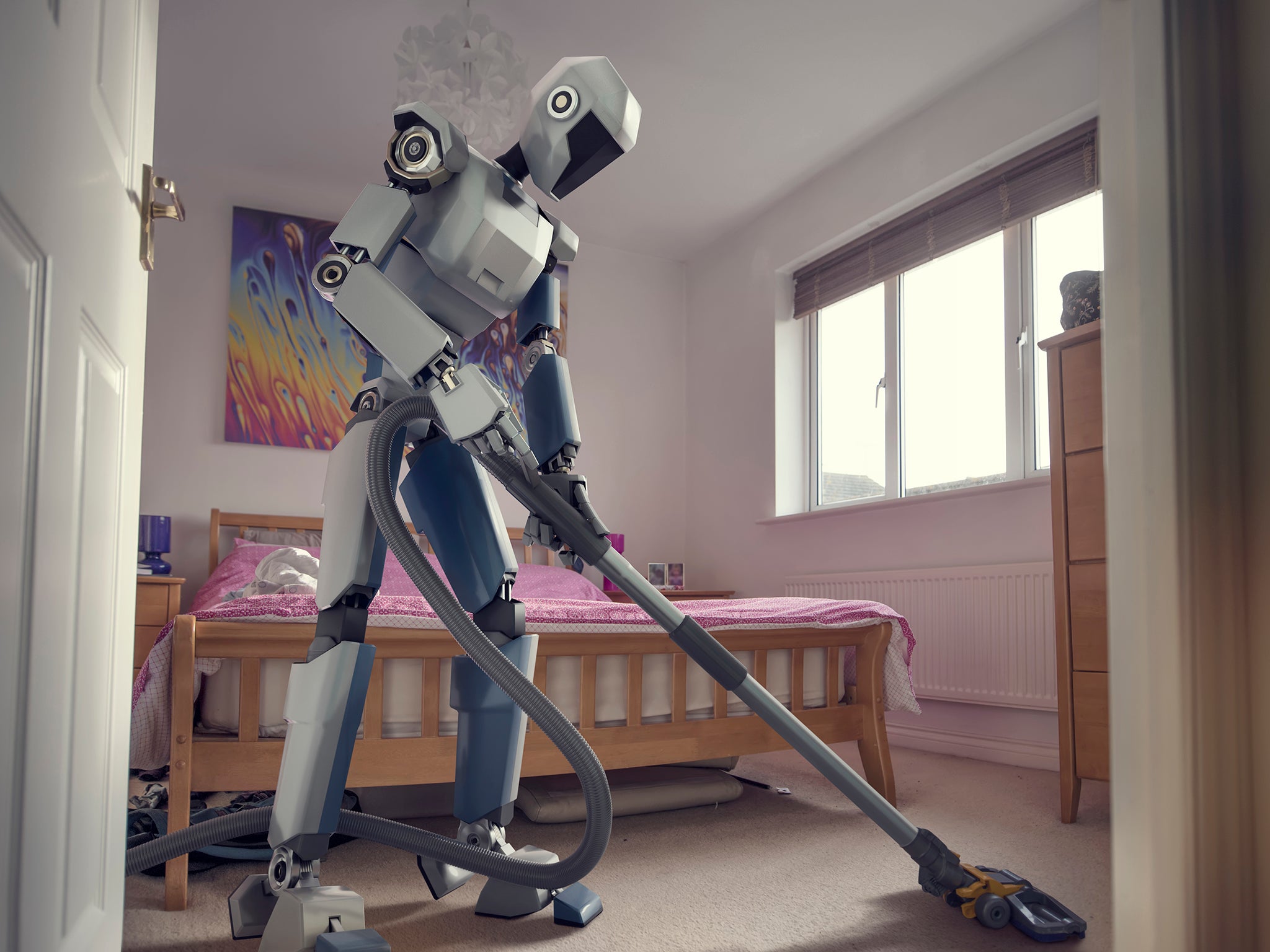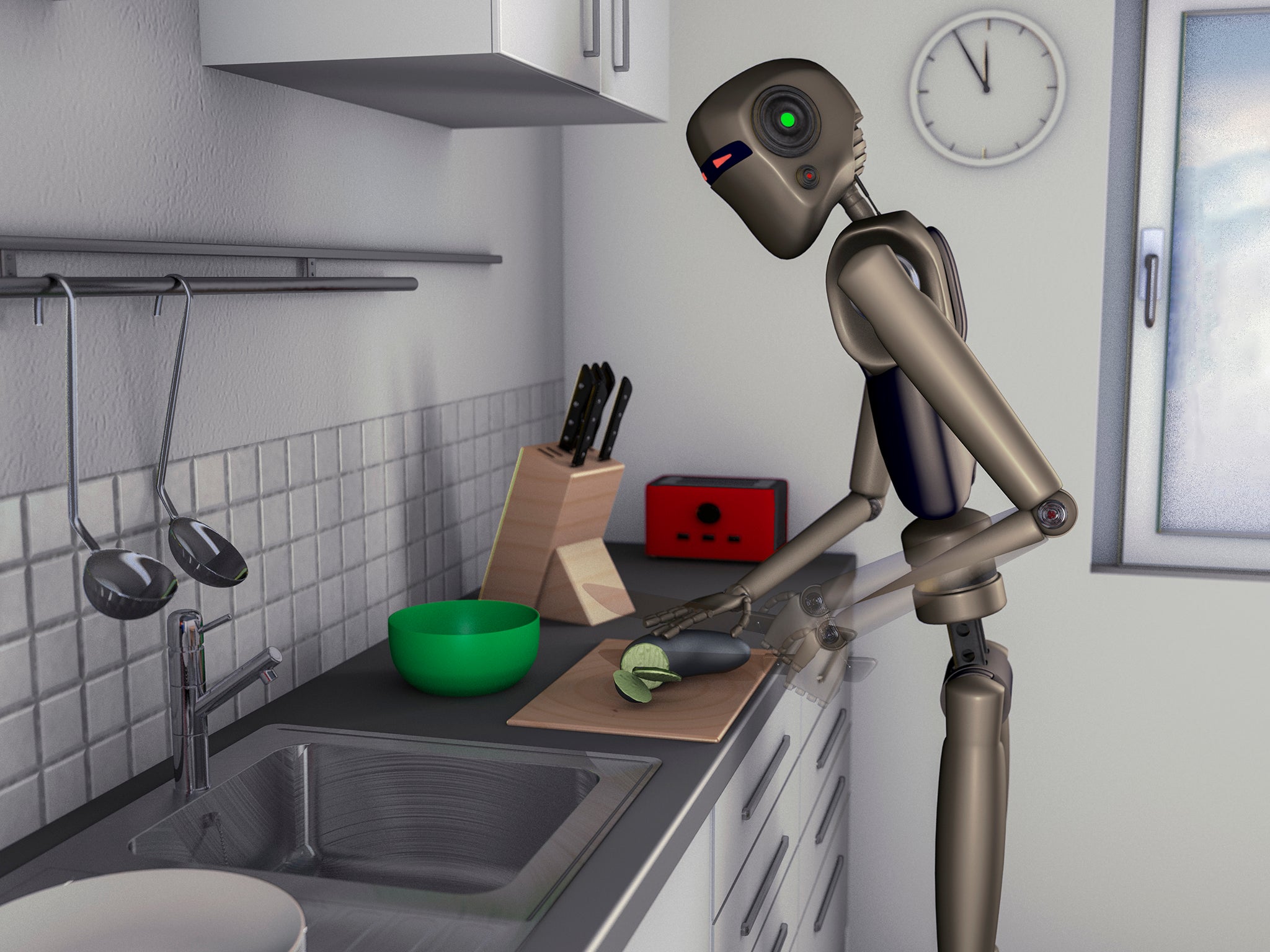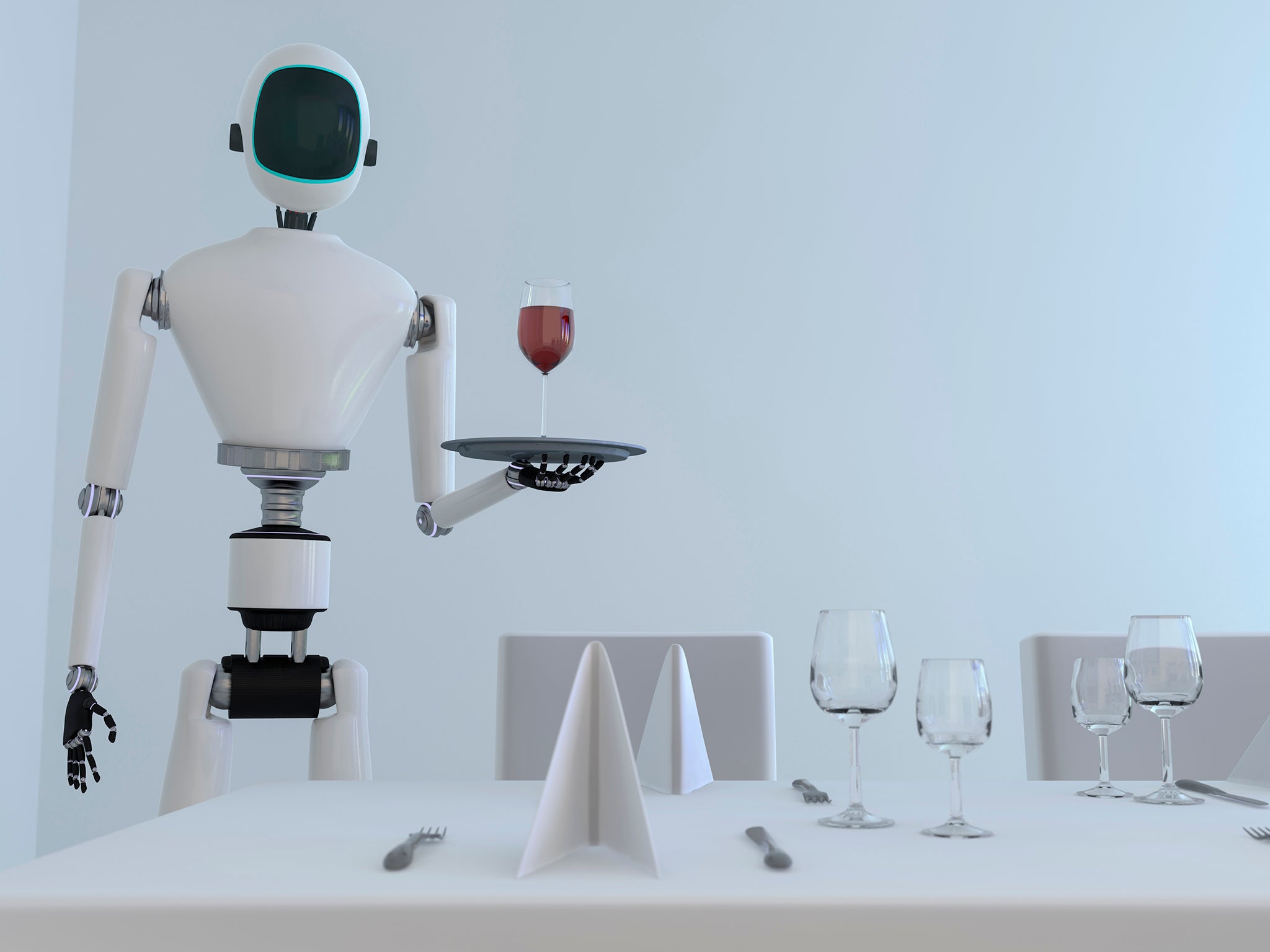The robots are coming – but will they really take all our jobs?
Artificial intelligence is going to transform the world, and our lives. But are we heading for a brave new world, or a science fiction horror-show?

Your support helps us to tell the story
From reproductive rights to climate change to Big Tech, The Independent is on the ground when the story is developing. Whether it's investigating the financials of Elon Musk's pro-Trump PAC or producing our latest documentary, 'The A Word', which shines a light on the American women fighting for reproductive rights, we know how important it is to parse out the facts from the messaging.
At such a critical moment in US history, we need reporters on the ground. Your donation allows us to keep sending journalists to speak to both sides of the story.
The Independent is trusted by Americans across the entire political spectrum. And unlike many other quality news outlets, we choose not to lock Americans out of our reporting and analysis with paywalls. We believe quality journalism should be available to everyone, paid for by those who can afford it.
Your support makes all the difference.Last week, Chancellor Philip Hammond announced in the Autumn Budget a £500m package of investment into tech initiatives, including the development of artificial intelligence.
Which must have had the Channel 4 executives ordering trebles all round, because with perfect timing they’ve designated this week the “Rise of the Robots season”, with a schedule that includes documentaries on the take-off of artificial intelligences (AIs) as consulting doctors, a David Tennant-narrated piece on the challenge of making robots as human as possible, and the one that’s had the tabloids hot under the collar, today'sThe Sex Robots Are Coming – which needs little further explanation.
Doctor Who and the Invasion of the Sex-Bots aside, though, is it actually possible that the dream of science fiction writers going back a century or more is on the verge of reality? Are we really about to live in the long-promised future of robots and AIs?
As they used to say on the old Six Million Dollar Man TV show (point of order – Steve Austin was a cyborg, not a robot), we have the technology… or we’re about to. And as Hammond said in the Budget: “We will harness this potential and turn it into the high paid high productivity jobs of tomorrow. Others may choose to reject the future, we choose to embrace it.”
But when is this future we are embracing going to come? And these highly paid jobs… who’s going to do them? Them, the robots, or us, the humans?

Well, without wanting to get all Terminator on everybody, it appears that the plum jobs will indeed be going to them. According to a report earlier this year by PricewaterhouseCoopers, almost a third of UK jobs could be affected by as soon as the 2030s. John Hawksworth, chief economist at PwC, told the BBC that “more manual, routine jobs” which “can effectively be programmed” were the most at risk, adding, that “jobs where you’ve got more of a human touch, like health and education” would be less affected.
Ah, but is that really the case? Channel 4’s documentary The Robot Will See You Now posits a near-future where robodocs are the norm, and according to CMRubinWorld, an organisation set up to prepare young people for a rapidly-changing world, one of the biggest changes will be in the classroom.
Writing for CMRubinWorld, former adviser to Tony Blair, Sir Michael Barber, says we shouldn’t just think about what jobs robots will take over, rather about how aspects and parts of jobs will become automated or handed over to AIs.
“It’s not just what jobs will exist and what won’t. It’s about what parts of current roles will be automated and what won’t,” says Barber, noting that while we will still need the human touch in jobs such as doctors and lawyers, “machines will often be more accurate” in terms of diagnosis and determination.
In terms of changes for global education, Barber says that “the combination of great teachers and sophisticated AI could be transformative”, but it is not a choice between teachers and AI, adding: “Fewer, more sophisticated teachers will combine with machines that relieve them of drudgery and provide a powerful evidence base for their teaching.”
So, no robot sir in mortarboard at the front of the class, but perhaps fewer actual teachers – though ones with a stronger grasp of how to deploy AIs in the classroom. Which might seem a little disappointing if we’re just talking about a whiteboard that can talk and fire erasers at the naughty kid at the back of the room.
But hold on. Azeem Azhar wants us to know that AI is going to be as important to us in the coming years as electricity was in the late-19th century.
“Today electricity is a utility, not even a commodity. It just works,” says Azhar, who works for Oslo-based tech and media group Schibsted. “You can’t really imagine life without it. It is the same everywhere in the world. Everything we do, we buy, is based on the assumption that we’ll have access to electricity. And today, more than 5.5 billion of us do.
“So when Andrew Ng, one of the most influential forces in today’s artificial intelligence boom, describes AI as the new electricity, we stop and take notice. After all, electricity changed industries, jobs, our everyday lives and our social and domestic relationships. Could we perhaps glimpse the second-order effects of artificial intelligence by understanding how electricity shocked the world?”

Schibsted has just released its annual Future Report, and robots and AI loom very, very large indeed. In the report, Azhar pushes the electricity-AI analogy to try to get across just how a vital part of our lives non-human intelligences are going to be.
“AI will be deployed rapidly, made available to every part of the industry and home very quickly,” he predicts. “In the UK, by 1933 one in three houses had electricity and a further 10 years down the road two out of three houses were electrified.
“AI will be deployed far more rapidly than the appliances that used electricity – because the components it needs to work are already in place. Smartphones in our pockets, wireless internet, digital cameras, cloud-based services. Artificial intelligence will be ubiquitous, wherever there is the internet.”
When Azhar was a boy, he would visit his grandparents’ home in Lahore, where they did not have a flushing toilet. This was an incredible thing to a child raised in the West. And once we get into life with the robots, we’ll struggle – like young Azhar – to wonder how we lived without them.
He says: “AI services will become indispensable. Life will seem inconvenient, even unpleasant, without it. Our expectations for interactions to be AI-powered will rise rapidly. We’ll expect our clinicians to spend time explaining our diagnoses to us, not diagnosing us, because AI systems will have more effectively identified our ailments than any human. We’ll tire of waiting in traffic queues with aching backs because our autonomous vehicles will find the best route for our journey.”
Which all sounds very lovely and futuristic. But is Philip Hammond’s £500m going to save our jobs, or throw us on the scrap-heap in favour of robots?
“Entire industries will benefit from the arrival of the AI as they did with electricity. AI will drive an analogous Schumpeterian process.”
Which means? “Industries arising, replacing others,” says Azhar. “Take the car industry: it has a century-old model of selling us cars through distributors who make money through service and repair. The car industry itself supports the advertising and media industry who are enlisted in manufacturing desire around this mode of transport.
“Yet the car industry looks like it will be upended by new modes of on-demand transport rental: autonomous vehicles routed to us by algorithms. Much like electricity, the biggest impacts of AI will be felt outside its home industry. AI will also transform work, and with that a transformation of our social relationships.
“Artificial intelligence will free up time by taking up some of our cognitive load. It could create free time for us, the same way cheap lighting enabled by electrification extending the day, for both work and leisure. There are any number of taxing but low-value tasks that you could foresee leaving to machines. What we do with all that time, remains to be seen.
“No wonder that as I talk to business leaders in industries like retail, health diagnostics, professional services and finance, their number one priority is artificial intelligence.”
Increased leisure time sounds like something we can all get behind, and those sci-fi pulps from the 1930s and 1940s featuring illustrations of humans enjoying themselves while robots do all the drudgery might be getting closer. But there are concerns – especially for those of us whose jobs might be at risk – and wider fears.
Azhar says: “Will AI amplify the biases in the world? Will AI lead to persistent and chronic unemployment? Will AI create new megalithic dominant firms controlling large parts of the economy?
“These are all real concerns. AI systems have already been demonstrated to systematically bias the bail assessments of black prisoners in the US. And academics Daron Acemoglu and Pascal Restrepo have demonstrated that the use of robots in industry depresses both wages and employment levels.

“And one only need to look at the dominance of Amazon in retail, and Google and Facebook in advertising, to see the risks of market dominance driven by data monopolies.”
Robots and AI might right now still seem the preserve of blockbuster movies and documentaries about sex-bots, but it’s no doubt the world is changing. If you’ve got an Apple Watch, it can warn from monitoring your heartbeat if you’re in imminent danger of having a heart attack.
You can download an app to your phone to allow you to have a video consultation with a doctor, rather than going to your GP. It’s not a great leap to a combination of the two: a non-human doctor available on your phone.
What no one has yet satisfactorily addressed is, when we are relieved of the drudgery of work by robots and have all this increased leisure time, how are humans going to afford to live.
Join our commenting forum
Join thought-provoking conversations, follow other Independent readers and see their replies
Comments